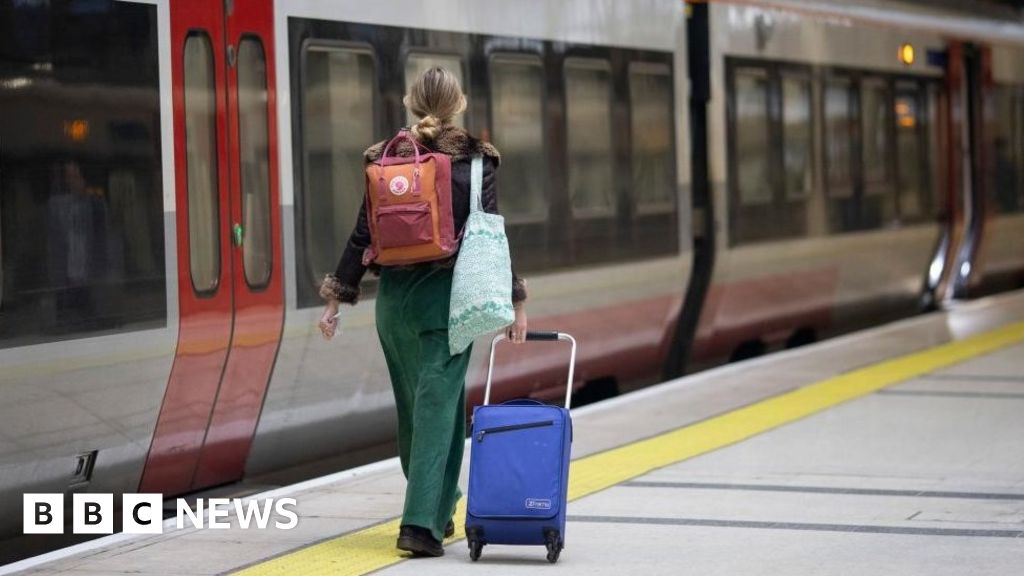Hopes Of End To Rail Strike Row As Workers Vote On Pay Offer

The UK's biggest rail union RMT has suspended strikes at Network Rail and will hold a vote on a new pay offer.
The surprise development will raise hopes of a breakthrough in the dispute between workers and the rail industry, which had appeared deadlocked.
Union bosses said it was up to workers how to vote on the new pay deal.
The new offer equates to a pay rise of up to 14.4% for the lowest paid workers and 9.2% for the highest paid, the union said on Wednesday.
While the government has not put more money on the table, under these proposals Network Rail rail employees would get this year's pay increase backdated by three months, ending up with a bigger lump sum.
The referendum will start on Thursday and close on 20 March.
RMT previously suggested members should reject December's pay offer.
Network Rail's chief executive Andrew Haines said the vote on the revised deal would give train staff the chance to end "many months of disruption to the railway network", and that he hoped RMT members would vote to accept the package.
RMT members who work for train companies - including train guards - are currently set to continue action, with strikes set for 16, 18 and 30 March and 1 April as well as next Thursday.
On Wednesday evening, the Rail Delivery Group, which represents train operating companies, urged the RMT to return to talks on Thursday, but asked for strikes to be called off before talks resume.
The RMT said it would join talks seeking a new offer, but before then will not call off the strikes, leaving it unclear whether or not talks with the RDG would resume.
However with workers at Network Rail - which manages the UK's rail infrastructure - no longer joining them, disruption will not be on the same scale and is likely to vary by operator.
Last month the RMT rejected what the industry and government described as "best and final" offers.
One was from Network Rail and the other from the RDG, representing 14 train companies employing guards and station staff.
The RDG, which is also still to agree a deal with the RMT, has now invited the union to hold urgent talks on the back of Network Rail's offer.
"The RMT leadership's decision to put Network Rail's deal to its membership is a welcome development, but train operating staff will rightly be asking why their union continues to deny them the opportunity to have their say on our equivalent offer," the RDG said in a statement.
The RMT has previously said it is "focused on coming to a negotiated settlement" and it had carried out an "in-depth consultation" before the decision to reject the pay offer was made.
The industry and government have said all along that any pay increase must come with changes to working practices.
Now, the RMT has said it is seeking an unconditional pay offer, among other requests.
There have been a number of false dawns in this long-running dispute.
But the RMT views Network Rail's tweaked offer as an improvement, and its communication suggests a shift in approach.
Significantly, this time it will not tell members how they should vote in the referendum.
The government hasn't put any more money on the table.
But this revised deal would see backpay increased.
There is now a wait to see what members make of it.
Without Network Rail's signallers joining in, RMT strikes lose some of their bite, and their national scale.
The question now is whether the Network Rail development will lead to any shift in the dispute with the train companies.
Strikes have been taking place across the country's railways since June last year.
Unions have argued any pay offer should reflect the rising cost of living - currently above 10%.
But the rail industry is under pressure to save money, after the pandemic left a hole in its finances. Bosses say reforms need to be agreed, to afford pay increases and modernise the railway.
During industrial action skeleton services have run on some lines with passengers often warned to avoid travelling where possible in case of disruption.
From Chip War To Cloud War: The Next Frontier In Global Tech Competition
The global chip war, characterized by intense competition among nations and corporations for supremacy in semiconductor ... Read more
The High Stakes Of Tech Regulation: Security Risks And Market Dynamics
The influence of tech giants in the global economy continues to grow, raising crucial questions about how to balance sec... Read more
The Tyranny Of Instagram Interiors: Why It's Time To Break Free From Algorithm-Driven Aesthetics
Instagram has become a dominant force in shaping interior design trends, offering a seemingly endless stream of inspirat... Read more
The Data Crunch In AI: Strategies For Sustainability
Exploring solutions to the imminent exhaustion of internet data for AI training.As the artificial intelligence (AI) indu... Read more
Google Abandons Four-Year Effort To Remove Cookies From Chrome Browser
After four years of dedicated effort, Google has decided to abandon its plan to remove third-party cookies from its Chro... Read more
LinkedIn Embraces AI And Gamification To Drive User Engagement And Revenue
In an effort to tackle slowing revenue growth and enhance user engagement, LinkedIn is turning to artificial intelligenc... Read more

